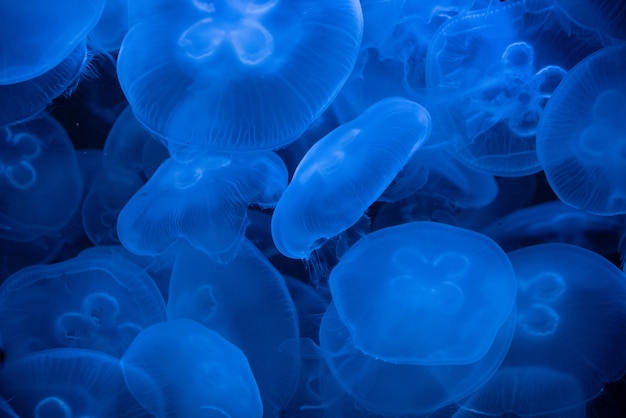Jellyfish Facts

Jellyfish have been around for more than 500 million years.
There are over 2,000 known species of jellyfish.
Jellyfish are not actually fish; they are invertebrates.
The largest jellyfish on record had tentacles that measured over 120 feet long.
Some species of jellyfish are immortal and can regenerate their cells indefinitely.
Jellyfish have been to space! Astronauts have brought them on space shuttles to study their behavior in zero gravity.
Jellyfish can range in size from as small as a pinhead to as big as a human.
Some species of jellyfish can glow in the dark, creating beautiful underwater displays.
Most jellyfish do not have brains or central nervous systems.
Jellyfish have been used in medicine to develop treatments for diseases like cancer and arthritis.
Some jellyfish can change their colors to blend in with their surroundings.
Jellyfish can reproduce both sexually and asexually.
Jellyfish have a gelatinous body composed of 95% water.
Jellyfish are found in every ocean, from the surface to the deep sea.
Jellyfish have been around longer than dinosaurs.
Some species of jellyfish have tentacles that can reach up to 100 feet long.
Jellyfish are important for the marine ecosystem as they provide food for many other organisms.
Jellyfish have specialized cells, called nematocysts, which they use to sting their prey.
Some jellyfish have the ability to clone themselves.
Jellyfish Facts part 2
Jellyfish eat by capturing their prey with their tentacles and then pushing it into their mouths.
Some jellyfish have a lifespan of only a few hours, while others can live for several years.
Jellyfish populations can explode due to overfishing and pollution, causing negative impacts on ecosystems.
Jellyfish have a unique movement called pulsing, where they contract their bodies to move through the water.
Some species of jellyfish can sting humans, causing painful welts and allergic reactions.
Jellyfish play a role in regulating the carbon cycle by consuming plankton and releasing carbon-rich waste.
Jellyfish blooms can be so large that they can be seen from space.
Jellyfish have existed in their current form for over 650 million years.
Jellyfish have been used in art and fashion, inspiring unique designs and patterns.
Some species of jellyfish can live in freshwater, including lakes and rivers.
Jellyfish have a transparent body, allowing them to blend in with the water and avoid predators.
Jellyfish have a simple structure, with a bell-shaped body and tentacles hanging down.
Jellyfish can survive in both warm and cold waters, as long as oxygen is available.
Jellyfish have a unique reproductive strategy called external fertilization, where eggs and sperm are released into the water.
Jellyfish have inspired the creation of underwater robotics, mimicking their movement and flexibility.
Some species of jellyfish have been found at extreme depths in the ocean, where the pressure and temperature are incredibly high.
Jellyfish have a unique way of capturing prey called a stinging nettle, which paralyzes the victim.
Jellyfish have been used in scientific research to study the effects of pollution on marine life.
Some species of jellyfish have bioluminescent abilities, emitting a soft glow in the dark.
Jellyfish have a natural ability to regenerate their lost body parts.
Jellyfish have a simple circulatory system that helps distribute nutrients throughout their body.
Some species of jellyfish can swim against the current by pulsing their bell-shaped bodies.
Jellyfish are skilled drifters, being carried by ocean currents for thousands of miles.
Jellyfish populations can undergo massive fluctuations, with boom and bust cycles depending on environmental conditions.
Jellyfish have a unique form of communication, using chemical signals to attract mates and warn off predators.
Jellyfish are fascinating creatures that continue to amaze scientists with their adaptability and survival strategies.

